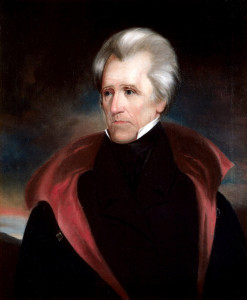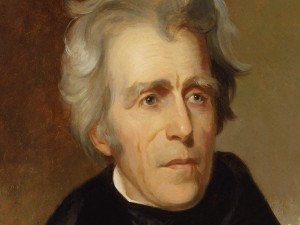Which future president is admitted to the bar today?
 November 21, 1787 — Today, Andrew Jackson is admitted to bar. Noted by historians to be one of the most critical and controversial figures in American history, he was a dominant player in the pivotal years between Thomas Jefferson and Abraham Lincoln.
November 21, 1787 — Today, Andrew Jackson is admitted to bar. Noted by historians to be one of the most critical and controversial figures in American history, he was a dominant player in the pivotal years between Thomas Jefferson and Abraham Lincoln.
The seventh President of the United States (1829–1837) was born near the end of the colonial era near the then-unmarked border between North and South Carolina.
His parents were a Scots-Irish farming family of relatively modest means. During the American Revolutionary War, Jackson acted as a courier. He was captured, at age 13, and mistreated by his British captors.
He went on to become a lawyer and was then elected to the U.S. House of Representatives, and the U.S. Senate. Nominated for president in 1824, Jackson narrowly lost to John Quincy Adams. Jackson’s supporters then founded what became the Democratic Party.
Nominated again in 1828, Jackson crusaded against Adams and the “corrupt bargain” between Adams and Henry Clay he said cost him the 1824 election. Building on his base in the West and new support from Virginia and New York, he won by a landslide.
Here are 5 other fascinating facts about Andrew Jackson:
In 1801, Jackson was appointed colonel in the Tennessee militia, which became his political and military base.
He owned hundreds of slaves who worked on the Hermitage plantation, which he acquired in 1804.
He killed a man in a duel in 1806, over a matter of honor regarding his wife Rachel.
Jackson gained national fame through his role in the War of 1812, most famously where he won a decisive victory over the main British invasion army at the Battle of New Orleans.
Jackson’s army was then sent to Florida where he deposed the small Spanish garrison. This led directly to the treaty which formally transferred Florida from Spain to the United States.
Sources
Words of Wisdom
As long as our government is administered for the good of the people, and is regulated by their will; as long as it secures to us the rights of persons and of property, liberty of conscience and of the press, it will be worth defending.





